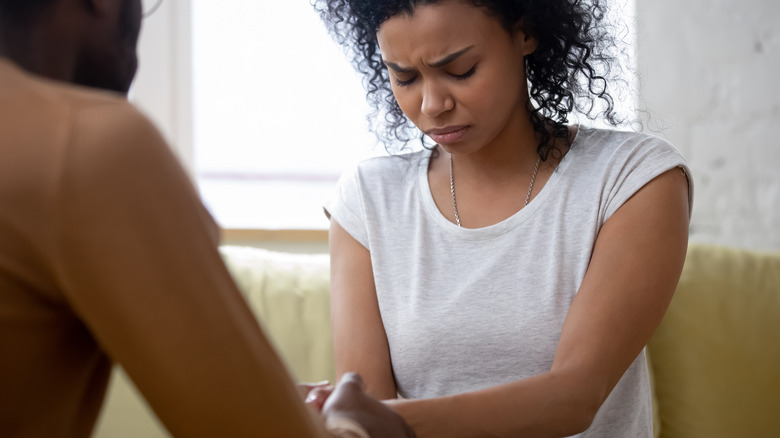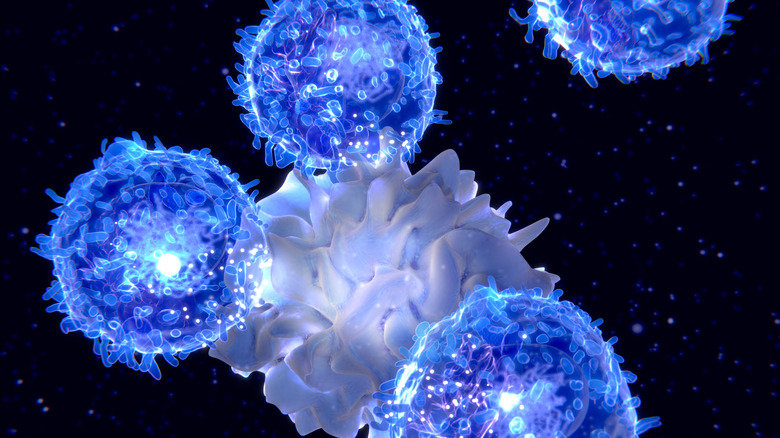When You're In Love, This Is What Happens To Your Body
Love is a drug, love is a battlefield. Love is bad medicine, an eternal flame; it leaves us breathless, all shook up, and shot through the heart. Love hurts.
Love may be an emotional experience, but we can't seem to help describing its effects in physical terms. And the truth is, love does have an influence on the body, impacting everything from long-term health to physical pain; it affects the activity of our brain, our hormones, and our immune system. Love can shape how we think and change how we sleep; it widens our pupils and makes us less neurotic. And if you were a starfish, love could even turn your stomach inside out (via Queen Mary University of London).
Whether you're lovesick, moonstruck, crushing on someone new, or once bitten/twice shy, there's no question that Cupid's arrow leaves a mark. Read on to find out why love is a matter of much more than just the heart.
Pretty much your entire brain falls in love
The stereotype is that when you're in love, you think with your heart instead of your head. But imaging studies show that your brain is an active participant in true love, not a spectator.
An analysis of six studies that took MRI scans of volunteers showed that when they looked at a picture of someone they were passionately in love with, multiple areas of their brain became active. Some of these activated neural networks are known to be associated with feelings of euphoria, and they also become active under the influence of drugs like cocaine. Other lit-up brain regions are involved in processing emotion and are used during higher-level functions like cognition and attention.
The scans also revealed that some areas of the brain became less active when feelings of love are evoked — namely regions involved in anxiety, fear, and grief. Even seeing the name of their romantic partner had this kind of impact on the brain. These effects not only show a scientific basis for romantic love, they also suggest that understanding the brain chemistry could lead to new therapies to help people cope with a broken heart when things don't work out, according to a press release about the study.
Your OTP helps you handle pain
Being in love is a natural pain killer. In fact, areas of the brain activated by love are the same areas affected by pain-killing medications, according to researchers who studied the effect of romance on pain tolerance (via PLOS One). They recruited 15 college students who were in the first nine months of a romantic relationship and described themselves as "intensely in love." The subjects were exposed to a mildly painful heat stimulus on their left hand while looking at pictures of their loved one or of a friend. MRI scans during the experiment showed how their brains reacted to the pain.
Not only did people rate the pain as significantly lower when viewing a picture of their romantic partner, but the scans also showed that seeing the image activated the brain's "reward systems," i.e., areas involved in motivation, reward, and addiction. "The region tells the brain that you really need to keep doing this," study author Jarred Younger said in a press release.
But there could be a flip side to this phenomenon: A rocky romance may make pain worse. In a study published in the Annals of Behavioral Medicine, researchers found that on days when people with diabetes or arthritis were feeling tension with their spouse, they reported higher levels of chronic pain.
You have trouble focusing when you're in love
It's not just your imagination. When you're madly in love, it can be difficult to concentrate on anything else. Researchers documented this by having 43 volunteers, each of whom was involved in a romantic relationship and had fallen in love in the previous six months, complete tests of their cognitive ability. Before taking the tests, the subjects were prompted to think about a romantic event with their partner and listen to their favorite love songs to intensify their feelings of romance. The intensity of their love was tested by having them rescue their loved ones from a pirate ship. Just kidding; actually, they filled out a questionnaire called the Passionate Love Scale.
In the tests, the volunteers had to quickly identify target information amidst distracting information; for example, to determine if a word matched the color it was printed in. It turned out that the more in love someone was, the worse they did at focusing on relevant information in the tests. According to the researchers, it's possible that this kind of effect is specific to the early stages of passionate love, when your brain is more fixated on the object of your affection. "For long-lasting love in a long-term relationship, on the other hand, it seems crucial to have proper cognitive control," said study author Henk van Steenbergen in a press release from Leiden University.
Your eyes reveal if you're in love with somebody
You can learn a lot about someone by studying their eyes, including whether or not they have love on their mind. This was borne out when researchers had 20 people view 200 pictures of couples and, in a separate session, individuals of the opposite sex. For each image, the study participants declared whether the photograph (shown on a computer screen) elicited any feelings of romantic love or sexual desire. An eye-tracking device was used to record where the viewers were looking when they evaluated the photos.
The data showed a clear difference in gaze patterns: The more that someone identified feelings of love, the more their eyes were drawn to the faces in their photographs. Feelings of sexual desire were more likely to be accompanied by a gaze fixed on the bodies in the pictures, rather than the faces. And while this may sound like a guy thing, it was true for both men and women in the study (via University of Chicago).
In the long run, love may keep your heart healthy
Being in a long-term relationship seems to decrease the odds of having a heart attack, according to a comparison of health data between married and single people. And if a heart attack does occur, people who are married tend to have better outcomes.
Researchers in Finland examined data relating to more than 15,000 cases of cardiac events in people age 35 or older. They found that the incidence of myocardial infarction, aka heart attack, was 58 to 66% higher among unmarried men, and 60 to 65% higher among unmarried women, compared to the rate among married couples. The mortality rate in the 28 days following a heart attack was 60 to 168% higher among unmarried men, and 71 to 175% higher among unmarried women.
There are multiple reasons why marital status is related to the risk of heart trouble, according to the European Society of Cardiology. It could be that married people tend to have better health because they get more social support and have better health habits. And should a married person have a heart attack, they might get to a hospital sooner because a spouse was present to call for help. A spouse's support could make it easier to keep up with therapy and medication afterward. It's also possible that the effect works in the other direction: People who have risk factors for heart disease might be less likely to get married.
Thinking about your sweetie can warm up your skin
Having the hots for someone is more than a figure of speech. When you're in love, your passion can produce actual temperature changes in some parts of your body. In a study of 60 volunteers, all of whom said they were in the throws of a passionate new love affair (no more than a few weeks old), researchers measured skin temperature while the subjects viewed pictures on a computer screen. Images of the people they were in love with triggered higher skin temperature in the forehead, nose, around the mouth, the cheeks, and really the entire face.
In another study, the researchers found that after someone's hand is placed in cold water, it warms up faster if they see images of their loved one. Feelings of love seem to increase vasodilation, that is, the widening of blood vessels that brings more warm blood to the surface of the body, the researchers said in a University of Grenada press release.
Love floods you with hormones that affect your whole body
"Falling in love" might be more accurately described as "drowning in love," or maybe "drowning in a sea of hormones and neurochemicals." The process begins in the early stages of attraction as our brain releases the neurotransmitter dopamine, reported CNN. This so-called "feel-good" chemical rewards us with sensations of euphoria in the presence of our crush, and primes us to want more. We also get a surge of adrenaline and norepinephrine, produced by the adrenal gland, which produces rapid heartbeat, sweaty palms, and other familiar physical symptoms of lovesickness. And a concurrent drop in serotonin levels makes it harder for us to concentrate on anything except the budding romance, according to Loyola University (via Newswise).
As the romance continues, these potent but short-lived effects are replaced by feelings of attachment, designed by evolution to keep couples together long enough for mating to occur. At this stage, physical closeness triggers the release of the hormones oxytocin and vasopressin, which strengthen social bonds and promote feelings of security and well being. One study suggests that oxytocin even helps promote monogamy.
When couples touch, their heartbeats and breathing synch up
Holding hands during a tough moment is more than a gesture of support, it has physical effects and can make people feel measurably better. Researchers who studied opposite-sex couples in a lab experiment found that if the couples held hands, their heart and breathing rates became similar.
It's a phenomenon called "interpersonal synchronization," and previous research has shown that this synching occurs between romantic partners in each others' presence. This study explored the concept further by testing the effect during stress. Each couple sat together while their heart and respiration rates were monitored. The woman in each pair was subjected to mild heat pain on her arm. The initial synchronization between the couple was interrupted when the pain was introduced. But when the couple held hands, their breathing and heartbeats synched up again. What's more, the women's rating of the pain they felt decreased after the couples touched.
How touch, symbolization, and pain relief are connected isn't clear, the researchers said. But they note that as social animals, we humans are wired so that skin-to-skin contact can activate the reward system in our brain, which in turn reduces pain.
The smell of your loved one can help you relax and get better sleep
Though the early stage of a passionate affair may leave you tossing and turning at night, love seems to be a sleep-positive experience in the long run. A long-term romantic partner promotes feelings of security and safety, which help you relax and fall asleep, according to a research team from the University of British Columbia. What's more, their research, which was published in the journal Psychological Science, shows that even the scent of your partner can improve sleep.
This effect was demonstrated by having volunteers, all of whom were in romantic heterosexual relationships, sleep on alternating nights with a T-shirt from their partner on their pillow, or with an identical but clean shirt. According to sleep diaries kept by the sleepers, as well as a monitor device worn on the wrist, their sleep was more efficient with their partners' T-shirts. That is, they spent a greater proportion of their time in bed asleep — enough to boost their sleep efficiency by 2%. That's about the same effect as taking a melatonin supplement. What's more, this effect took place even if the sleeper didn't know, or guess, that the shirt carried their partner's scent.
In another study, the same researchers found that women who smelled their partner's shirt felt calmer before and during a stressful interview, and had lower levels of the stress hormone cortisol.
Love stimulates your brain to think creatively
While there's evidence that the heat of passion can fog up your thinking, it also seems true that thoughts of romance can put your mind into a creative mode. Love seems to stimulate global thinking, reported Scientific American. That is, it prompts the brain to consider the forest rather than the trees, making more original and unexpected connections.
In a pair of studies, researchers had people imagine scenarios involving love, sex, or a neutral experience, or flashed them relevant words on a computer screen (like "love" or "sexuality"). Then they had them try to solve problems requiring either creativity or analytical thinking. It turned out that people who were thinking of love were better at creative problems, while thoughts of sex had the opposite effect: They made people less creative, but better at solving problems requiring logical analysis (via Psychology Today).
The implication, according to Scientific American, is that love induces a long-term perspective. It moves us to think of future goals, wishes, and long-term plans with our partner, whereas sexual desire is more of a here-and-now mode of thinking, stifling creative thought but filtering out distraction.
Falling in love triggers a woman's immune system
The concept of being "lovesick" takes on a different meaning when you realize that in some ways, the human body can react to falling in love as if it was a disease.
In a small study, researchers tracked the health of 47 women who at the start reported being in a new relationship, but not in love. The women had blood tests at the beginning of the study, and again when they reported falling in love with their partner, and a third time if the relationship ended during the two-year study period. Comparisons of the blood samples showed that falling in love was accompanied by had an increase in the activity of genes that activate the immune system's defense against viruses. Specifically, the women produced more of an anti-viral protein called interferon. And falling out of love was associated with a drop in interferon levels, as the Daily Mail detailed.
Since this study involved women only, it could be that this phenomenon is a preparation for possible pregnancy, the study authors said in a press release (via Tulane University). Or it might be a preemptive defense against viruses that could be spread by close contact.
Blood pressure is lower in people who are (happily) married
A romantic relationship is like your blood pressure: They both have their ups and downs. But over the long haul, a happy marriage seems to be better for your blood pressure than being single. On the other hand, an unhappy relationship is worse.
One study published in the Annals of Behavioral Medicine had about 300 people wear blood pressure monitors for 24 hours. They found that blood pressure tended to drop during the night for married people, while for single people it was more likely to remain high, a marker for cardiovascular disease. But when the quality of the marriage was taken into account, as measured by questionnaires filled out by the study subjects, overall blood pressure was found to be higher in people who were unsatisfied with their marriage, compared to single people. "In other words, one is better off single than unhappily married," the researchers wrote.
Interestingly, single people who reported having lots of friends and social support didn't get the benefit of lower blood pressure. "There seem to be some unique health benefits from marriage," study author Brigham Young University professor Julianne Holt-Lunstad said in a press release. She continued, saying, "It's not just being married that benefits health — what's really the most protective of health is having a happy marriage."
People in happy marriages are healthier all around
As far as "in sickness and in health" goes, we can all probably agree that "in health" is preferable. The good news is, good health seems to be a fringe benefit of a happy marriage.
As part of a study published in the Journal of Marriage and Family, researchers analyzed data relating to more than 1,600 married people, whose health was tracked for twenty years. They were also surveyed about the level of conflict in the marriage during the course of the study. Not only did people in the happiest marriages report the best health at the beginning of the study, as time went on, but higher marital happiness was also associated with better health. Conversely, marriages that reported higher levels conflict of conflict tended to report poorer health.
The likely reason for this phenomenon, according to the researchers, involves the "social support hypothesis." In a satisfying, supportive relationship, couples are emotionally close and act as confidants for each other, which is protective against stress. In a troubled marriage ... eh, not so much. In fact, a dysfunctional relationship is itself a potential source of stress. Also, spouses in a happy marriage monitor each other's health-related habits, encourage doctor visits and other healthy behaviors, and may spot problems or symptoms. "That support reduces stress and helps buffer against a decline in health," study author and family life researcher Rick Miller, told Brigham Young University News.
Love may prepare us for the world our ancestors lived in
So why do fools fall in love? Why does anybody? One academic review of the subject, published in the journal Frontiers in Psychology, noted that romantic love provides human beings with a number of reproduction-related benefits. It helps us learn about potential mates and it promotes pair-bonding and fidelity between partners. Hormonal changes may even increase fertility in women and encourage parenting behavior in both sexes.
But romance has its downsides. Courtship causes us to expend resources. It brings a risk of unwanted pregnancy and the costs and responsibilities of parenthood. Love reduces symptoms of depression and strengthens the immune system, but it can expose us to sexually transmitted diseases, stress, and, for women, complications of childbirth.
Some of our modern struggles with love may be due to what scientists call an "evolutionary mismatch." We're living in a very different world than when romantic love first became a human trait. Our predecessors probably encountered fewer potential mates than us, for example, meaning we fall in and out of love more often than perhaps we're evolutionarily equipped to handle. Perhaps prehistoric couples didn't need to concern themselves with the passion going out of their relationship because, inevitably, childbirth and mother-infant bonding would take precedence. But our modern world can change things for the better, too. For example, technology allows us to keep in touch — and the flame of romance alive — while separated by great distances, whereas our forbearers had no such option.















